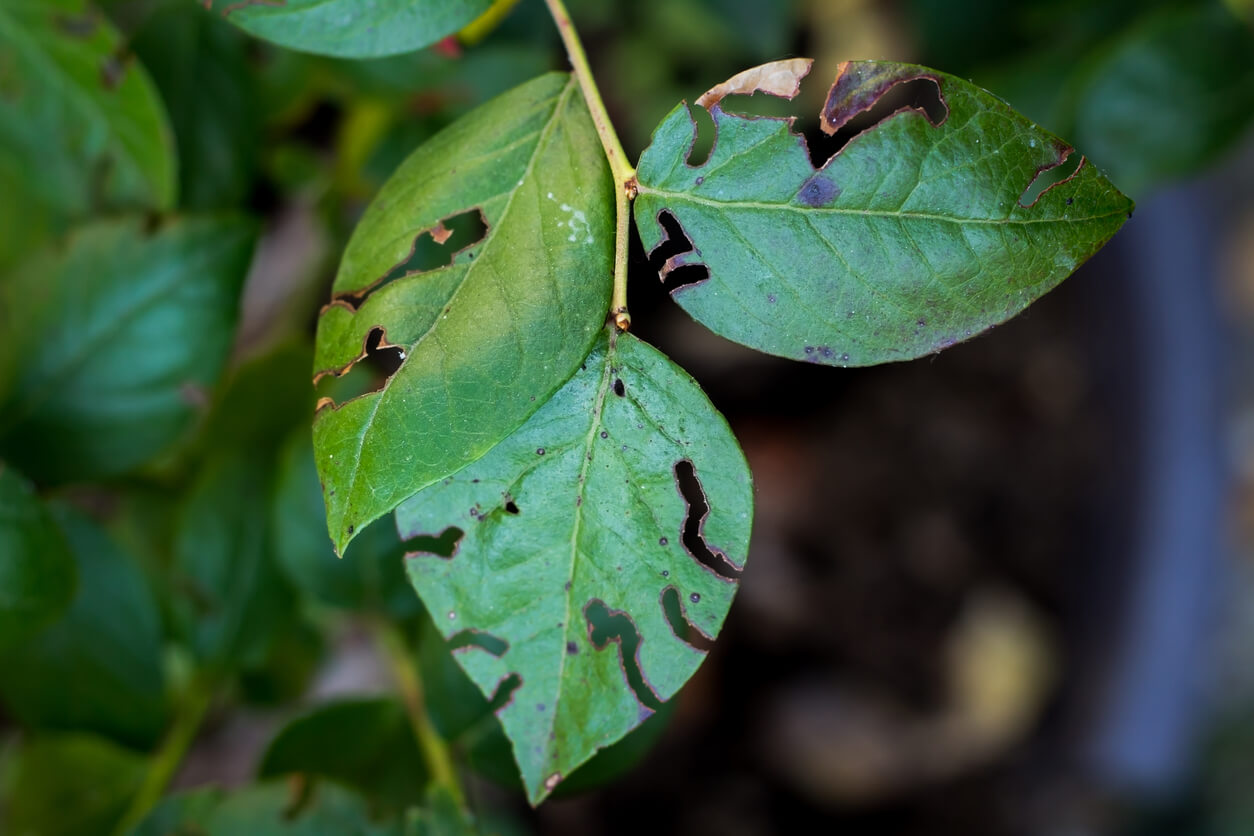
Leaves of blueberry plant damaged by pests.
Pests on your blueberry bushes, left unchecked, can damage and destroy your crop and kill your lovely plants. Keeping a close watch on your bushes during regular daily inspections will help you spot any pests before they can do irreparable harm. Healthy blueberry bushes can bounce back from pest damage if you catch the pests quickly.
Spot the symptoms of blueberry bush pests
Check leaves, branches, and fruit for these symptoms that come from pests on the prowl!
On Blueberry Leaves and Branches/Canes
| Symptoms | Pest |
| Terminal leaves are dried out or wilting; pinhole visible below the wilted leaves | Blueberry tip borer |
| Galls (swellings) appear on canes where the wasp has laid eggs. New galls change from greenish to red; older galls appear gray and corky with exit holes | Blueberry stem gall wasp |
| Whitish coating on underside of leaves or on branches; sometimes looks like blisters | Scale |
| Stippled leaves that curl and become distorted | Thrips |
| Yellowing leaves; clusters of small “bumps” on underside of leaves | Aphids |
| Skeletonized leaves | Japanese beetle |
| Small holes in leaves | Flea beetle |
On Blueberry Buds, Flowers, and Fruit
| Symptoms | Pest |
| Hollowed-out, discolored berries | Blueberry maggot |
| Tiny black specks | Mites |
| Buds damaged or cut off | Cutworms, spanworms |
| Damaged berries | Fire ants |
| Worms in berries | Fruit worms |
| Withering, browning fruit | Spotted wing drosophila |
| Crescent-shaped wounds in berries; small brown scabs on fruit; early fruit drop | Plum curculio |
| Pin-prick holes with a green or yellow border | Stink bugs |
| Broken, missing fruit | Birds, deer |
How to treat pests on blueberry bushes
Here are some proven ways to get rid of pests on your blueberry bushes. Choose the best treatment for the type of pests invading your plants.
-
- Pick off the pests. Use your garden gloves to remove the pests by hand. After removal, destroy pests by drowning them in a bucket of soapy water or crushing them with your foot. Handpicking isn’t efficient or practical for very small pests but works well with larger pests.
- Cover up. If birds or deer are making a meal of your blueberries, you might want to drape some bird netting over the bushes. They’ll still get all the light they need, and you can deter your fine feathered friends. Perhaps there’s a suet cake or seed feeder you can use to lure them away from your garden? Some gardeners swear by grape Kool-Aid® — unsweetened —and mixed with water. Spray it on your blueberries as they begin to mature; birds reportedly do not like the taste. To deter deer, you can string several lines of twine or wire around your blueberry bushes at different heights (1’, 3’, 4’) or put wire mesh fencing around your bushes.
- Remove overripe or deformed fruit. If you notice any deformed fruit or fruit that looks like it’s rotting on the bush, remove it as soon as possible. Rotting fruit can attract pests that further damage your bush or cause disease.
- Apply insecticidal soap. Insecticidal soap is organic. The potassium salts in insecticidal soap help remove an insect’s protective waxes, causing destruction of insect membranes and killing them. Mix the soap with water to create your solution and apply directly to insects on any plants. While insecticidal soap is less apt to affect other organisms, certain plants might be sensitive to the soap and can suffer leaf burn.
- Apply horticultural oils. Combine plant- or petroleum-based oils with water to produce horticultural sprays. Neem oil, for instance, is derived from seed extracts of the neem plant. Oil-based sprays block an insect’s air holes, interfere with an insect’s metabolism, disrupt insect feeding, and inhibit insect growth. Like insecticidal soaps, horticultural oils can cause plant injury if not properly diluted.
- Make your own pest spray. You can make your own pest spray with benign materials. Mix one tablespoon of baking soda, 1/2 teaspoon of a mild dish detergent, and 2 1/2 tablespoons of olive oil in a gallon of water to make a solution that will repel all kinds of bugs, as well as a fungicide for mildew on the blueberry plant leaves. Shake it well in your bottle before spraying and repeat every week for it to be continuously effective.
- Trap them. Strategic placement of sticky traps can snag flies and other bugs, and sometime their larvae as well, as they emerge from the ground.
- If your bush is infested, act quickly. If you discover that your blueberry bush is infested and you’ve tried all natural or store-bought pest solutions and still can’t control it, you may need to cut off and destroy any infected plant material. And remember not to compost it! You don’t want to create a home for future infestations.
Do pests attack your blueberry bushes every year? How do you handle removing them—and even preventing them in the first place? Please tell us how you treat your blueberry bushes to avoid pests.


 Previous
Previous


how to get rid of fire ants in my blueberry plant. I tried borax and sugar in a plastic bottle, they are not getting into the bottle to eat it – tried twice.